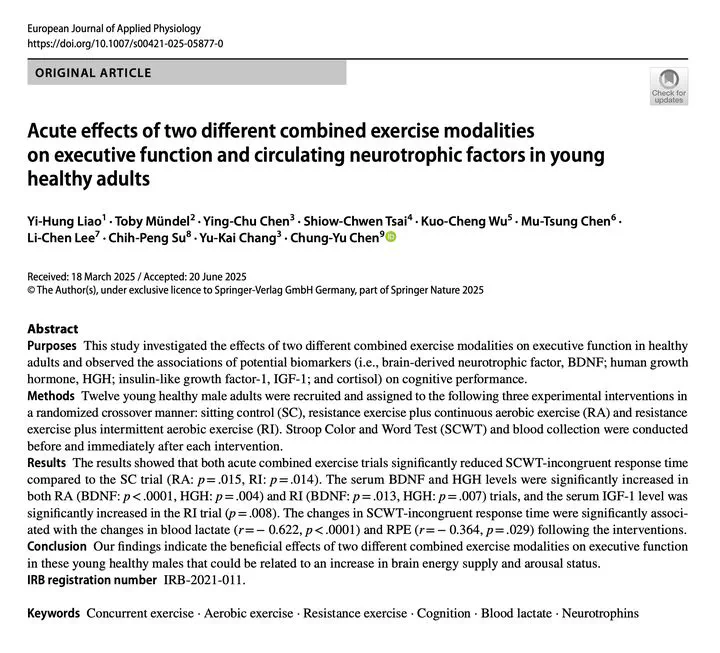Acute effects of two different combined exercise modalities on executive function and circulating neurotrophic factors in young healthy adults
Jun 20, 2025·
,
,
,
,
,
,
,
,
,
·
0 min read
Yi-Hung Liao
Toby Mündel
Ying-Chu Chen
Shiow-Chwen Tsai
Kuo-Cheng Wu
Mu-Tsung Chen
Li-Chen Lee
Chih-Peng Su
Yu-Kai Chang
Chung-Yu Chen
 Image credit: Yi-Hung Liao et al.
Image credit: Yi-Hung Liao et al.
Abstract
Background: This study investigated the acute effects of two different combined exercise modalities on executive function in healthy young adults, and explored how changes in neurotrophic factors were associated with cognitive performance.
Methods: Twelve healthy young male adults participated in a randomized crossover trial consisting of three experimental conditions: sitting control (SC), resistance exercise plus continuous aerobic exercise (RA), and resistance exercise plus intermittent aerobic exercise (RI). Stroop Color and Word Test (SCWT) and blood samples were collected before and after each intervention to assess executive function and biomarkers (BDNF, HGH, IGF-1, cortisol).
Results: Both RA (p = .015) and RI (p = .014) trials significantly improved SCWT-incongruent response time compared to SC. Serum BDNF and HGH increased significantly in both RA (BDNF: p < .0001; HGH: p = .004) and RI (BDNF: p = .013; HGH: p = .007), while IGF-1 increased significantly only in RI (p = .008). Decreased SCWT-incongruent response time was significantly associated with changes in blood lactate (r = −0.622, p < .0001) and RPE (r = −0.364, p = .029).
Conclusion: Acute combined exercise modalities enhance executive function in healthy young males. These improvements may be related to increased brain energy supply and arousal, as reflected by elevated neurotrophic factors and physiological responses.
Type
Publication
In European Journal of Applied Physiology